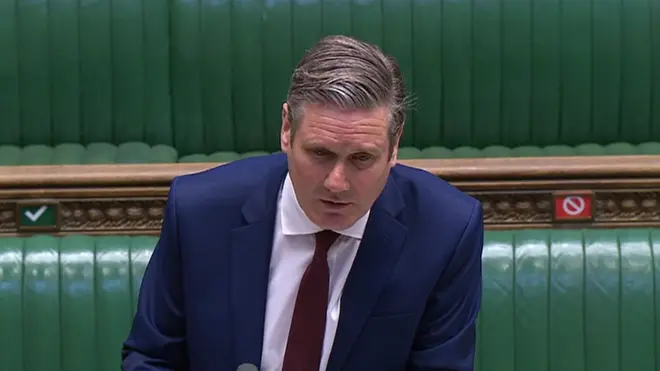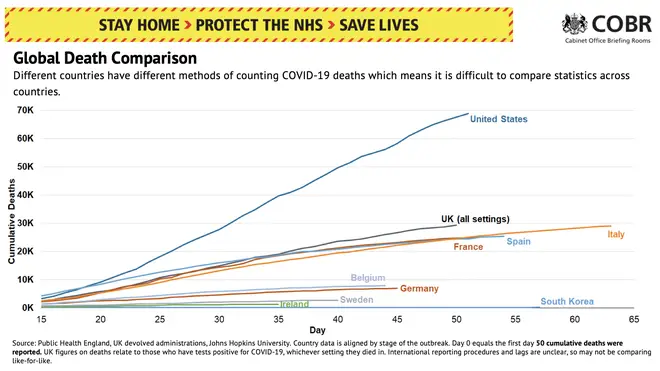
Clive Bull 1am - 4am
6 May 2020, 14:25

Keir Starmer grills Boris Johnson on Coronavirus 'success' in first PMQ's clash
Boris Johnson was questioned by Labour leader Sir Keir Starmer today over the UK’s "appalling" coronavirus death toll after the Prime Minister claimed the Government’s approach to the virus had been successful.
At Mr Johnson’s first PMQs since returning to work after beating Covid-19, Mr Starmer challenged him over the UK’s death toll, which is now the highest in Europe at almost 33,000.
In his first speech back in the chamber today, Mr Johnson said he “knew that there would be many people looking now at our apparent success” amid the epidemic.
Read more: Chancellor preparing to 'wean' businesses off coronavirus furlough scheme
Mr Starmer said: “When the Prime Minister returned to work a week ago Monday, he said that many people were looking at the apparent success of the government’s approach.
“But yesterday we learned, tragically, that at least 29,427 people in the have now lost their lives to this dreadful virus.

“That’s now the highest number in Europe. It's the second highest in the world. That's not success or apparent success.
"So can the Prime Minister tell us how on earth did it come to this?"
Mr Johnson replied: "Of course, every death is a tragedy and he's right to draw attention to the appalling statistics, not just in this country but of course around the world."
He added: "At this stage I don't think international comparisons and the data is yet there to draw all the conclusions that we want."
Mr Johnson also said that the UK's coronavirus lockdown could be lifted by Monday. He announced that he is looking at lifting the lockdown from the start of next week, but only if the scientific data shows the spread of the disease is sufficiently under control.
Mr Johnson said the Government had taken decisions to "save lives and to protect our NHS", adding: "I believe there will of course be a time to look at what decisions we took and whether we could have taken different decisions, but I have absolutely no doubt that what the people of this country want us to do now is to suppress the disease, keep suppressing the disease and to begin the work of getting our country's economy back on its feet."

During Wednesday’s Commons clash, the Prime Minister also set a new 200,000 daily coronavirus testing target, adding that his "ambition" was for the new testing goal to be met by the end of the month.
The Government met its 100,000 a day testing target by the end of April but has failed to maintain that level in early May.
A "fantastic testing regime" will be critical to the UK's long-term economic recovery, he said.
The route out of lockdown will rely on a test, track and trace programme to quickly identify new cases of coronavirus and prevent the further spread of the infection.
Although hospital deaths are falling, ministers and officials have struggled to get a grip on the crisis in care homes - where some of the most vulnerable people risk contracting the disease.
Listen & subscribe: Global Player | Apple Podcasts | Google Podcasts | Spotify
Mr Johnson said: "There is an epidemic going on in care homes which is something I bitterly regret and we have been working very hard for weeks to get it down and a huge amount of effort has been gone into by literally tens of thousands of people to get the right PPE into care homes, to encourage workers in care homes to understand what is needed."
He said there had been a "palpable improvement" in the situation in care homes in recent days.
A total of 32,898 deaths have been registered in the UK where Covid-19 was mentioned on the death certificate, including suspected cases.
The current lockdown rules are expected to remain in place following a review of the evidence which is due by Thursday.
But Mr Johnson will use an address to the nation on Sunday to set out his "roadmap" for the way ahead.
He told MPs: "What the people of this country want us to do now is to suppress the disease, keep suppressing the disease and to begin the work of getting our country's economy back on its feet."
But it would be an "economic disaster" if relaxing the rules too far meant a second spike in the disease requiring the reintroduction of lockdown measures.